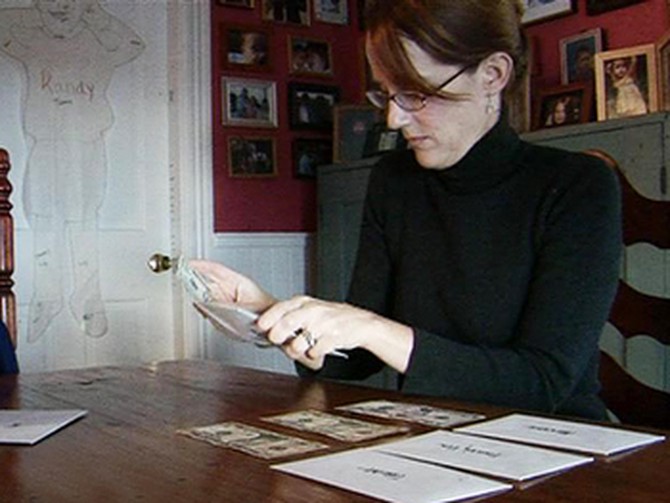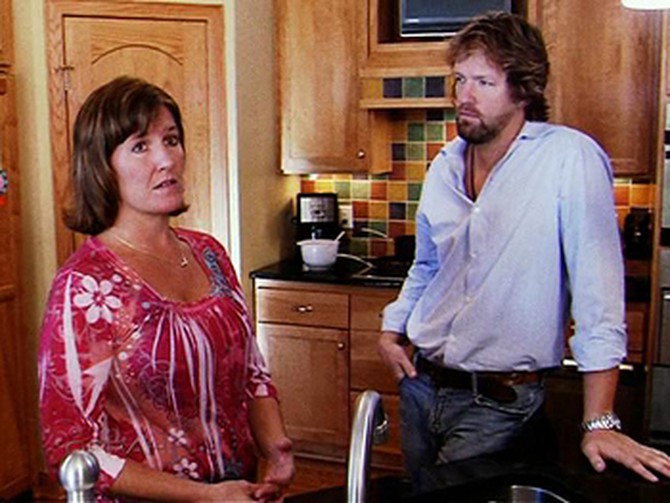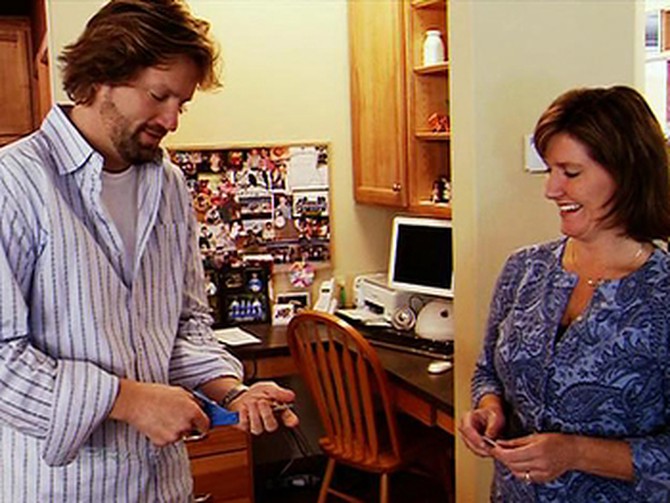Money-Saving Hints

On October 7, 2008, the DOW dropped over 500 points and stocks in Europe and Asia plummeted overnight. CNBC's Dylan Ratigan says the root of the crisis is that people have been unrealistic about finances.
"The problem that we have right now is one where too many Americans collectively borrowed more than we can afford to pay, and we created a system on Wall Street to support that culture," he says. "Now we're all dealing with the consequences."
"The problem that we have right now is one where too many Americans collectively borrowed more than we can afford to pay, and we created a system on Wall Street to support that culture," he says. "Now we're all dealing with the consequences."

Americans should take the economic meltdown as a cue to start changing their ways, Dylan says. "This is the biggest wake-up call for America since the country came to be, or at the very least since the Great Depression," he says. "The fact that we were willing to pay $40 a month to borrow $1,000 on our credit card...if it looks to good to be true, it is too good to be true."
Dylan says the crisis will pass, but people need to fix their spending habits in the meantime. That may be hard for generations of people who have gotten used to buying things with credit, but Dylan says it's necessary. "We have a couple of choices here," he says. "We get thrifty and become more intelligent ... or we deal with dire consequences as a result of not getting responsible for our money once and for all."
Dylan says the crisis will pass, but people need to fix their spending habits in the meantime. That may be hard for generations of people who have gotten used to buying things with credit, but Dylan says it's necessary. "We have a couple of choices here," he says. "We get thrifty and become more intelligent ... or we deal with dire consequences as a result of not getting responsible for our money once and for all."

The dramatic drops in the stock market are a result of people's fear and lack of confidence in the economy, Dylan says. "The stock market, unfortunately right now, is a reactive mechanism," he says. "You are not seeing the stock market predict some grand future outcome. You're seeing the stock market saying, 'Listen, we're concerned that the people in America are not going to be able to pay their bills and as a result the banks will be stuck with those bad debts.' If you don't pay your bills, that just doesn't go away. That goes to a bank ... and if the bank can't handle it, you know where it goes? To the government. And the government then takes it out of the taxpayer," he says. "All you are seeing in the stock market right now is a reaction to the fear that we have."
It may take a while for American banks to be able to lend again in a way that's healthy for us all, but Dylan says once the economy stabilizes and Americans feel more confident, the stock market will improve.
It may take a while for American banks to be able to lend again in a way that's healthy for us all, but Dylan says once the economy stabilizes and Americans feel more confident, the stock market will improve.

In order to solve the economic crisis, Dylan says every American needs to be responsible and have three priorities. First, stop borrowing more money than you can afford to pay back. Second, understand that someone who lends you money makes more for himself if you borrow more.
Finally, and most importantly, Dylan says to figure out a way to pay your bills. "The more we are able to pay the bills collectively—the credit card bills, the car bill, the house bill—the smaller this problem will be for everyone in America."
Finally, and most importantly, Dylan says to figure out a way to pay your bills. "The more we are able to pay the bills collectively—the credit card bills, the car bill, the house bill—the smaller this problem will be for everyone in America."

Even in difficult times there are things everyday people can do to save money, and Oprah Show viewers have been leading the pack. Best friends Cassandra and Stacy each wanted to redecorate their living room, but neither of them wanted to spend the money on new furniture. Instead, they traded couches and saved $2,000!
Stacy, who owns a dance studio, says she is also bartering to save cash. "There's a family that dances at my studio, and they have a restaurant that my family enjoys," she says. "So they come and take lessons ... and we get to go to their restaurant and eat."
This year, Cassandra is using the plums from her plum tree to make jelly and jam for all her friends instead of spending $350 on Christmas gifts. "Thirty dollars for buying the cans, the sugar and wrapping paper, and I ended up with 32 jars of jelly and jam that is just fabulous," she says.
Stacy, who owns a dance studio, says she is also bartering to save cash. "There's a family that dances at my studio, and they have a restaurant that my family enjoys," she says. "So they come and take lessons ... and we get to go to their restaurant and eat."
This year, Cassandra is using the plums from her plum tree to make jelly and jam for all her friends instead of spending $350 on Christmas gifts. "Thirty dollars for buying the cans, the sugar and wrapping paper, and I ended up with 32 jars of jelly and jam that is just fabulous," she says.

To save on her electric bill, Rhondalyn unplugs everything in her home when it's not in use. Appliances, TV sets and lamps that are plugged in pull in energy even if they are turned off, and Rhondalyn says the small change has added up. In May 2008, her energy bill was $268. After she started unplugging, her bill went down to $91. And when Rhondalyn got really vigilant—even turning off the air conditioning—her energy bill was only $60.42. That's over $200 in savings!

The Marvel family takes an annual camping trip. Last year, the getaway cost them more than $1,500. This year, they passed on travel and set up Camp Marvel in their backyard for an at-home vacation.

Felicity is a mom of three with a baby on the way. To keep better track of where her money goes, Felicity takes cash from the bank every Friday and divides the money into six envelopes labeled for allowance, gas, groceries, takeout and everyday use. "When it's gone, it's gone," she says.

Kristi got tired of paying high gas prices, so she decided to put her entire family on bicycles. Her two older children can pedal themselves, while the three younger kids sit in bench seats attached to her bike.
See all of the money-saving tips!
See all of the money-saving tips!

Andrea's household income was slashed by more than 60 percent when she lost her job and her husband's hours were cut back. They've started saving big money by making small changes, including taking a calculator to the grocery store. Her husband makes his coffee and lunch at home each morning rather than buying them at work, and Andrea teaches an aerobics class at her gym in exchange for a free membership.

Families all over the country are tightening their belts during this economic crisis, but some people are actually finding that cutting back can lead to richer lives. The Heinz family makes a net income of $58,000 a year—but they have $70,000 in savings. How'd they do it?
Sue Heinz is a stay-at-home mom with four children living in Sarasota, Florida. To keep their family out of financial worry, she and her husband, Brett, have gotten thrifty. With a prepaid cell phone used only for emergencies, the family's monthly bill is just $5.
By brown bagging his lunch and carpooling to work, Brett spends little money during the work week and saves $122 each month on gas.
Sue has found a way to snip $550 from their yearly budget by cutting the family's hair herself. And with a little online research, Brett found out how to do his own home repairs and says he has saved more than $6,000.
Sue Heinz is a stay-at-home mom with four children living in Sarasota, Florida. To keep their family out of financial worry, she and her husband, Brett, have gotten thrifty. With a prepaid cell phone used only for emergencies, the family's monthly bill is just $5.
By brown bagging his lunch and carpooling to work, Brett spends little money during the work week and saves $122 each month on gas.
Sue has found a way to snip $550 from their yearly budget by cutting the family's hair herself. And with a little online research, Brett found out how to do his own home repairs and says he has saved more than $6,000.

Sue says their thriftiness began 11 years ago when she and Brett first moved to Florida on a teacher's salary. "We had goals," she says. "We wanted to own a home, we wanted to have a big family—and we knew we had to set our priorities to make that work."
The ride hasn't been all smooth sailing, and Sue says they incurred some credit card debt along the way. "But I'm very happy to say, and proud to say, that we're paying it back at nearly three times the minimum balance," she says.
Although they've had to cut back in certain areas, Sue says their thrifty ways haven't curbed their lifestyle one bit. "We go to the beach once a week, we go bike riding with the kids, we do all kinds of fun things," she says. "There are second-run movie theaters; there are a lot of ways to have fun without spending money."
"It's an alternative to living beyond our means, really," Brett says. "Instead of spending too much money on things, we just make choices."
The ride hasn't been all smooth sailing, and Sue says they incurred some credit card debt along the way. "But I'm very happy to say, and proud to say, that we're paying it back at nearly three times the minimum balance," she says.
Although they've had to cut back in certain areas, Sue says their thrifty ways haven't curbed their lifestyle one bit. "We go to the beach once a week, we go bike riding with the kids, we do all kinds of fun things," she says. "There are second-run movie theaters; there are a lot of ways to have fun without spending money."
"It's an alternative to living beyond our means, really," Brett says. "Instead of spending too much money on things, we just make choices."

On the other end of the spectrum, the Sandberg family is learning the need to cut back for the first time. Vicky and Mark have been married for 15 years and have two children. Until recently, the family has always brought in a double income. "Times in the construction industry have been really tough, and four months ago I lost my job as a recruiter and as a trainer," Vicky says.
With about 40 percent of their total income gone, the family has a new set of stress. Vicky and Mark say they've had to cut back their investment contributions toward their children's college funds and froze their individual retirement accounts. "My personal biggest fear is losing what we have, what we've worked so hard for," Mark says.
With about 40 percent of their total income gone, the family has a new set of stress. Vicky and Mark say they've had to cut back their investment contributions toward their children's college funds and froze their individual retirement accounts. "My personal biggest fear is losing what we have, what we've worked so hard for," Mark says.

Can thrifty couple Sue and Brett help Vicky and Mark find ways to cut back? They begin with the Sandbergs' monthly budget and discover the Sandbergs are spending $650 a month in department stores on things for the kids—clothing, video games and DVDs. "That's a big number," Sue says.
In addition, the Sandbergs are spending $190 each month on their phone, Internet and cable bill and $350 a month eating out at restaurants. All in all, the family is spending $8,744 a month, which is more than they are bringing in.
In addition, the Sandbergs are spending $190 each month on their phone, Internet and cable bill and $350 a month eating out at restaurants. All in all, the family is spending $8,744 a month, which is more than they are bringing in.

To get Vicky and Mark on track, Sue says they need to bring their monthly budget down to less than $8,000 per month. Sue gives them a basket for storing their daily receipts and a journal to write down their needs and wants. "You're going to take a good look and start to become extremely aware of where this money is going," she says.
First to go are all but one of Vicky and Mark's credit cards—for emergencies only—in exchange for a debit card with a rewards program. "I love the idea of having a debit card and paying as you go," Mark says. "I think that would relieve a lot of stress at the end of the month."
Because Vicky and Mark have two cell phones, Sue suggests dropping their landline and finds a cable company that offers a better deal. They instantly save more than $100 a month!
Sue takes the couple to the grocery store and teaches them how to prepare a meal for under $5. There are even leftovers, which can be used for Mark's lunches. Sue says the family can still enjoy eating out—with the proper research. By searching online, Sue says you can find restaurants that let kids eat for free on certain nights of the week. "Google your town's name plus 'free stuff' or 'kids' free meals,' and things pop up," she says.
Sue also has a tip to save money on the DVDs the kids ask for—go to the library and rent the DVD for free!
First to go are all but one of Vicky and Mark's credit cards—for emergencies only—in exchange for a debit card with a rewards program. "I love the idea of having a debit card and paying as you go," Mark says. "I think that would relieve a lot of stress at the end of the month."
Because Vicky and Mark have two cell phones, Sue suggests dropping their landline and finds a cable company that offers a better deal. They instantly save more than $100 a month!
Sue takes the couple to the grocery store and teaches them how to prepare a meal for under $5. There are even leftovers, which can be used for Mark's lunches. Sue says the family can still enjoy eating out—with the proper research. By searching online, Sue says you can find restaurants that let kids eat for free on certain nights of the week. "Google your town's name plus 'free stuff' or 'kids' free meals,' and things pop up," she says.
Sue also has a tip to save money on the DVDs the kids ask for—go to the library and rent the DVD for free!

In all, Sue and Brett helped Vicky and Mark find an extra $2,000 a month. "It felt great because we didn't know what we were spending," Vicky says. "It's really a mind-set. Mark and I have worked very hard to have what we have for our family and provide for them, but he'd spend what he'd spend, I would spend what I would spend and we'd pay the bill at the end of the month, and we just weren't paying attention."
Mark is also thrilled with the family's new money habits. "It was a lot less stress at the end of the month," he says.
Mark is also thrilled with the family's new money habits. "It was a lot less stress at the end of the month," he says.

With the cost of food rising and moms everywhere cringing over their grocery receipts, one mom has found a way to save her family thousands of dollars. Stephanie Nelson, founder of CouponMom.com, says she actually looks forward to grocery shopping! Can she buy a week's worth of food at half the price?
Stephanie begins her plan of attack by researching coupons online. "It's actually easier than ever to use grocery coupons today because we can use the Internet to print coupons," she says. "In about half an hour a week, you can make a real difference in cutting your grocery bill in half."
With coupons in hand, Stephanie hits the store and fills up her shopping cart with $127 worth of groceries. "Don't panic," she says. "That's not what we're paying." As the clerk scans coupon after coupon, the total falls lower and lower—until it hits $37.16, a 71 percent savings!
Get Stephanie's strategic shopping tips to save money on your groceries.
Stephanie begins her plan of attack by researching coupons online. "It's actually easier than ever to use grocery coupons today because we can use the Internet to print coupons," she says. "In about half an hour a week, you can make a real difference in cutting your grocery bill in half."
With coupons in hand, Stephanie hits the store and fills up her shopping cart with $127 worth of groceries. "Don't panic," she says. "That's not what we're paying." As the clerk scans coupon after coupon, the total falls lower and lower—until it hits $37.16, a 71 percent savings!
Get Stephanie's strategic shopping tips to save money on your groceries.

It's no secret that it's a difficult time to sell a home—so some sellers are getting creative. When Jennifer from Charleston, South Carolina, needed to sell her house, she says no one was biting. After five months and no offers in sight, Jennifer put her house on Craigslist. Two days later, it sold.
Karen from Hancock, Maryland, was having trouble finding a buyer for her farmhouse, so instead of selling, she decided to raffle off her home. She sold tickets for $100 apiece and agreed that any extra money raised beyond the appraised value would go to charity. After selling more than 6,000 tickets, Karen was able to unload her house and give more than $200,000 to a local charity. If this sounds interesting to you, check the laws in your state.
After two and a half years on the market, Mike and Pam from Streamwood, Illinois, needed an unconventional way to sell their home. They searched online to see if anyone wanted to swap houses and found OnlineHouseTrading.com—did they make a match?
Karen from Hancock, Maryland, was having trouble finding a buyer for her farmhouse, so instead of selling, she decided to raffle off her home. She sold tickets for $100 apiece and agreed that any extra money raised beyond the appraised value would go to charity. After selling more than 6,000 tickets, Karen was able to unload her house and give more than $200,000 to a local charity. If this sounds interesting to you, check the laws in your state.
After two and a half years on the market, Mike and Pam from Streamwood, Illinois, needed an unconventional way to sell their home. They searched online to see if anyone wanted to swap houses and found OnlineHouseTrading.com—did they make a match?

Mike and Pam found Lauren and Ryan, homeowners in Elgin, Illinois, who wanted to upgrade their home. It was the perfect match for Mike and Pam, who were looking to downsize. Mike and Pam sold their home for $295,000 and purchased Lauren and Ryan's home for $180,000. "We were able to sell our house at the price we wanted, and they were able to sell their townhouse at the price they wanted," Pam says.
"We're all happy," Ryan says. "It was an even trade in the sense we both got exactly what we wanted. We were looking for a house with four bedrooms, a basement and a backyard that would be fenced in for our dogs, and we ended up getting that."
If you're interested in finding a creative way to sell your home, make sure to check out the laws in your state first.
Find more money-saving advice.
"We're all happy," Ryan says. "It was an even trade in the sense we both got exactly what we wanted. We were looking for a house with four bedrooms, a basement and a backyard that would be fenced in for our dogs, and we ended up getting that."
If you're interested in finding a creative way to sell your home, make sure to check out the laws in your state first.
Find more money-saving advice.
Published 10/08/2008

